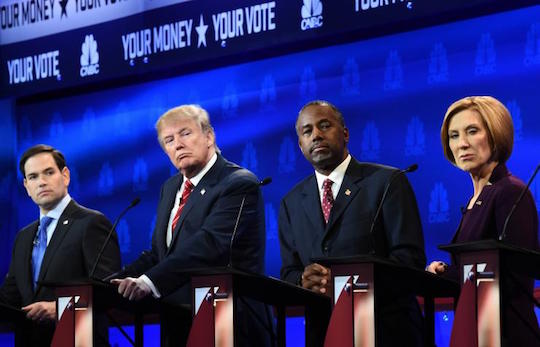About an hour into last night’s Republican debate, Ohio Governor John Kasich excoriated Donald Trump’s mass-deportation plan, calling the idea that we might deport 11 million undocumented immigrants “not an adult argument.” We have to do it,” Trump replied. “We have to.” But how would he do it? Once he had removed the immigrants from their homes, would he put them in camps while he determined their countries of origin? Or would he just deport them all—Guatemalans, Uighur Chinese, Nigerians, French—to Mexico? Will the deported immigrants fly commercial, or will there be some kind of train? These are the questions no one asked at the fourth GOP debate, while we waited for a real candidate to take the stage. But this is it. These vague, impossible ideas are not ciphers for real policy different Republicans will tell us about later. There is no one behind the curtain.
Right now, Trump and Ben Carson enjoy the support of 50% of Republican voters. Depending on which polls you believe, Marco Rubio runs third with about 10%. Perhaps, any day now, half the party will turn on the eerily similar front-runners and throw their support behind Rubio. Or perhaps this is the level of discourse we’re going to get.
Here’s some foreign policy from a guy currently polling first in the Republican nomination for president:
“We have to say, how do we make [ISIS] look like losers? And I think the way to make them look like losers, we have to destroy their caliphate.”
It’s true that destroying ISIS’s caliphate would make them resemble losers, in the sense that the caliphate is a metonym for their entire organization. And losers are people who have been defeated. So the question to ask, Carson says, is how can we defeat ISIS? And we defeat them by destroying them.
We talk about it by referring to ISIS in comment-section terms of derision borrowed from Trump. It says something about Carson’s understanding of politics and pragmatism that the phrase he reaches for when discussing a theocratic crime syndicate selling people into slavery and destabilizing the Middle East is “losers.” As a front-runner for the presidency who has no government experience, he lives in a world of pure appearances.
That world is untroubled by fact. Carson observed that multiple factions were operating in Syria, and that “the Chinese are there as well as the Russians.” While Russia is executing bombing missions in support of Assad, the Chinese are not in any way there. They are also not part of the Trans-Pacific Partnership trade agreement, although their currency manipulation was the centerpiece of Trump’s objection to it.
Rand Paul corrected him on that one, before the moderator got a chance to. The audience laughed, and Trump looked tired. Maybe, as his bombast becomes more familiar, mistakes like that will become the foreground in a field of vague qualities voters used to like. But if and when Trump voters defect, will they throw their support behind Marco Rubio—a well-polished US senator with a Hispanic last name? Or will they simply switch from the loud Trump to the quiet one, Carson?
Maybe, as Robert Reich suggests, the fundamental conflict of our era is not between right and left, but between “the global financial elite and the rest of us.” The common feature of the two Republican front-runners is not policy, but outsider status. Particularly in taxation, their policies are generally the same as the other, less successful candidates. The difference is that they’ve never done anything like this before and appear not to know what they’re talking about. Maybe to the contemporary electorate, that’s a feature, not a bug.
Regardless, I am through waiting for the actual Republican nominating process to start. I’m increasingly worried this is it. I suppose that’s good, since neither Trump nor Carson would stand a chance in next year’s general. The ongoing success of these buffoons is guaranteed to put a Democrat in the White House in 2016, right?
It’s just a shame that the Republican Party has finally abandoned sense. One of our two major parties has abdicated its role as the practical voice in American politics, the one that insisted on talking about what we could do instead of what we should.
That kind of Republicanism is moribund. The kind that hates Washington and big banks and all the other winners in an increasingly unfair global system—that’s the Republicanism that is vibrant now. It’s ironic that the standard-bearers of populism are a billionaire and a neurosurgeon, and it’s scary that populism-versus-power appears to be a campaign conducted without recourse to fact. But when that ethos runs against a former president’s wife funded by the financial services industry, it will lose, right?
Right? Please tell me that the 2016 general will not be corrupt versus stupid. But if it must, please tell me corrupt will win.




